FUTURE OF US-ROK RELATIONS
VADM Young-Kil Suh, ROKN (Ret.) has an interesting piece on the topic in this month’s Strategic Insights. He assesses the current state of the relationship and then offers four possible models for it future evolution, depending on a series of eventualities. His conclusion:
As long as the North Korean threat remains as is, it makes no sense to alter the U.S.-ROK alliance. The need for a strong deterrent, both in terms of conventional forces and the nuclear umbrella, remains crucial. Clearly this model is suitable and feasible for the situation, and we have 50 years of history to prove it.
As the two Koreas move towards unification, however, the alliance would shift. At first the U.S. presence would remain as is, but as talks progressed and relations become normalized the United States could begin to lessen its presence on the peninsula and South Korea could begin to take on a greater portion of its own defense. Such a move would demonstrate goodwill towards reconciliation efforts by North Korea. As unification draws near, the ROK-U.S. alliance could shift further still, acknowledging the normalization of relations and allowing the United States to focus on regional concerns. By not jumping immediately to a regional security model, thereby removing a significant U.S. troop presence, the alliance retains flexibility in responding or reacting to any breakdowns in negotiations. It also acknowledges that moves toward unification could have ‘ripple effects’ on the Southeast Asian security environment, and allows the United States and South Korea to maintain adequate resources to aid in regional security matters.
The timetable for these shifts, and the specific inter-Korea interactions they would be bound to, is tricky to determine–one need only look at the steps and missteps toward the Agreed Framework in the 1990s to understand how difficult these negotiations will be. But there is no doubt that movement towards unification will necessitate a change in force projection on the peninsula and indeed in the very nature of the U.S.-Korea(s) alliance.
Finally, assuming a smooth transition to a unified Korea, the alliance will be irrevocably changed–the threat requiring a strong U.S.-Korea alliance will be removed, and tensions within the region will trump tensions on the peninsula as the focus of all concerned. However, the U.S-Korea alliance will be able to proceed immediately to a political alliance. Three factors will dictate the speed at which the alliance can move towards a regional security model and eventually to a political alliance: the economic hardships created in the North over the past half-century and the necessary strains of uniting two long-separated nations; the regional stability and security environment; and Korean relations with the other regional powers–namely China and Russia.
Sounds about right.

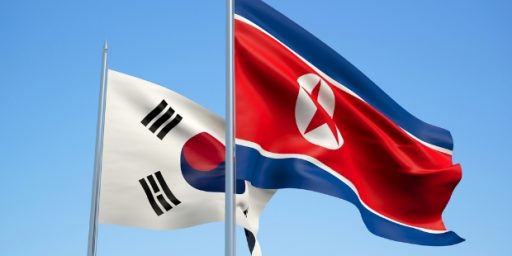
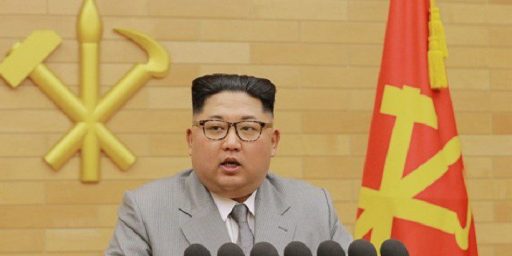
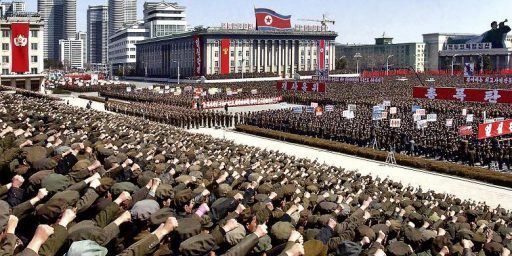
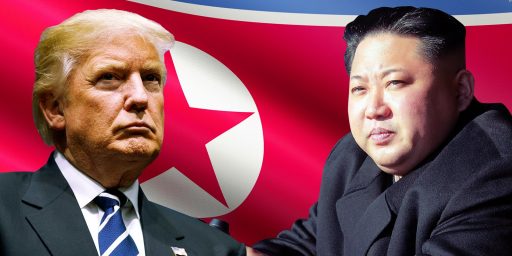
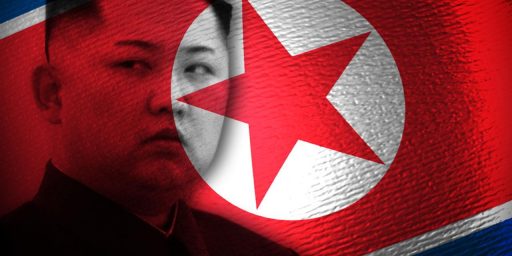
This reads like a strategy paper devoid of any reality of what is going on in North Korea and it sounds pleasant – like the two Koreas are just separated due to some little blip in history and everyone is going to work together to remove that darn DMZ.
But there are a few problems. First you an insane lunatic running NK. Second, you got this little problem of mass starvation and brutality of the NK population – just picture the country as a giant Auschwitz. In the event of a united Korea and this brutality coming (more) to light, the world will want people to blame (ya know, just like we are still hunting down Nazis over 50 years later). So NK is going to want some sort of agreement to give it a pass on Crimes Against Humanity. And quite frankly, I don’t think that is going to happen.
So this theory isn’t going to pass until you got a new Dear Leader in NK. The guy isn’t old, so you either have to take him out or file this paper away for another few decades. Or come up with another strategy.
—